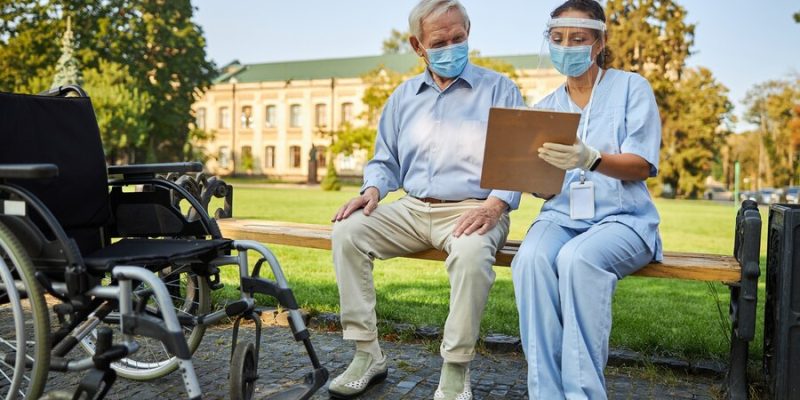The Role Of Nurse Practitioners In Rural Healthcare

Access to healthcare is a major challenge in many rural communities throughout the nation. Limited medical facilities, long distances to the nearest hospitals, and a lack of health practitioners usually characterize these locations. Nurse practitioners (NPs) provide crucial support within this landscape.
Equipped with vital clinical knowledge and commitment to community care, these dedicated professionals fill the gap and offer necessary health services. As demand for universal and equitable healthcare builds in rural areas, NPs are being acknowledged more and more for their imperative role in ensuring that they reach our most remote residents.
The Unique Healthcare Challenges In Rural Areas
It is easy to think of rural landscapes as large, calm, and connected areas. Although these aspects create a feeling of solace and belonging, they also pose unique challenges with regard to the accessibility to healthcare.
The first and very obvious problem is the distance. Geographical distances among residents are immense, and individuals must travel long ways to get to the closest health facility. These long trips can be tiring, time-consuming, and often impossible without reliable transportation, especially for someone who is not well or requires regular checkups.
Even when one overcomes the distance, they may not have access to the necessary medical services. Healthcare facilities are often scarce in rural areas. Usually, there is only one health clinic within a large region, which often lacks specialized services and complex medical equipment. This means that residents who require special care may need to move closer to an urban center.
There is also a layer of complexity related to economic problems. In many rural areas, poverty is more common due to employment challenges and lower middle earnings. This can lead to the residents lacking medical coverage or funds to visit clinics for regular medical checkups, treatments, or surgeries.
Lastly, these challenges also have cultural and educational aspects. For instance, some rural communities may be guided by age-old myths in making health decisions. Lack of access to health education materials can also contribute to a lack of awareness about some medical conditions, their prevention or treatment.
While rural life has its appeal, it comes with particular trials. Nurse practitioners play a priceless role in addressing these healthcare challenges.
Expanding Access To Healthcare Provided By NPS
Nurse practitioners are game changers in rural healthcare settings. Their job is not simply to provide front-line treatment; it is about reaching out to communities that may otherwise feel abandoned.
Rural populations have unique health needs that NPs are well suited to. They can diagnose, treat and manage many different health conditions, which reduces the need for patients to visit remote specialized centers. Instead, this flexible healthcare delivery system provides comprehensive healthcare in communities with limited accessibility, where specialized care is seldom available.
This capacity to offer top-notch care in a variety of areas only evolves after some time. It is the product of relentless preparation and intense dedication to the medical field.
Mastering The Craft: A Closer Look At Training
Prerequisites for the role entail intensive study at a reputable institution such as Texas Woman’s University. Their Master of Science in Nursing – Family Nurse Practitioner (FNP) program is not only directed to the clinical side of healthcare but also incorporates understanding and relating to various patient populations.
Successful graduates from such programs are armed not only with the medical knowledge but also holistic skills that are necessary for patient care, particularly in rural areas.
The nature of an NP job, especially in underserved areas, has its set of challenges. However, it also has its incentives, both tangible and intangible. Insight into the salary of a nurse practitioner in Texas can motivate those considering this new path. Through competitive remuneration, NPs are acknowledged for the critical part they play and the skills they have developed. It also spurs more people to think about the rewarding career that they could have while serving rural areas that benefit from their much-needed services.
In short, the role of NPs in rural healthcare is more than medical; it is about community and connection and ensuring that regardless of where you live, everyone has an equal opportunity to enjoy good health.
Preventative Care And Health Education
Generally, with regards to any healthcare ailment or condition, it is always better and cheaper to prevent an illness than to cure it. This philosophy is even more significant in rural areas, where healthcare resources are often scarce and medical facilities may not be easily accessible.
Preventative care refers to services such as routine examinations and screening procedures, as well as immunizations. Monitoring one’s health regularly can help in detecting and addressing problems before they become chronic. For rural populations, this translates into fewer emergency trips, reduced medicine costs and better health.
However, one question arises: how does the community learn to appreciate care for preventing diseases? This is the pivotal role of nurse practitioners.
NPs are uniquely trained to provide holistic care and to focus on the community. NPs can conduct health camps, school sessions and community workshops to share vital information on hygiene, proper nutrition, common diseases and the need for routine medical check-ups. They have the opportunity to help demystify medical jargon and make health information usable by everyone, regardless of their level of education.
In addition, making positive contributions to health education in early life helps support healthier adult outcomes. Educating children and young adults about good health, nutrition, and hygiene will help them to adopt lifelong healthy habits. These habits can play an instrumental role in minimizing the risks of chronic illnesses, including diabetes, heart disease and obesity, especially when they have limited access to health education.
NPs can have a long-lasting impact on the rural population through preventative care and health education as their efforts support both immediate wellbeing and generational health.
Telehealth Advancements And Its Impact
Telemedicine is an innovation that has helped transform rural healthcare in the digital age. It is now possible to live miles from the nearest health facility and consult with a clinician through a video call or an app. That is the magic of telehealth.
In places with scarce healthcare access, telemedicine is particularly important. It may not be possible to see a doctor for every small ailment for those located in rural areas. The option to communicate with a medical expert without leaving home can be invaluable.
The power of telehealth can be perfectly harnessed by nurse practitioners due to their adaptability and patient-centered approach. Due to their broad general training, NPs can deal with various health issues virtually. NPs can provide a range of services from instructing patients on how to deal with a chronic disease to providing an initial diagnosis or calming an anxious client via telemedicine.
Telehealth has not been an exception in terms of facing problems. Firstly, there is the matter of technology access and literacy. Even though most people may possess smartphones or computers, they may feel uneasy using healthcare apps or platforms. The next issue is connectivity, as some rural areas have only patchy internet connectivity. Additionally, telehealth is not appropriate in some cases where the patient needs to be physically examined or treated, but it does provide a partial solution.
However, the future looks promising. Telehealth will also expand in functionality as technology improves and becomes more user-friendly alongside better internet connectivity in more communities. Combining efforts to educate communities about using these platforms and the constant improvement of telehealth software means that this mode of healthcare delivery will only get stronger.
Ultimately, although telehealth is not a panacea for all ills, it provides NPs with an invaluable opportunity to broaden their coverage, enabling even the remotest persons to get the quality of care they deserve.
Chronic Disease Management In Rural Settings
In rural communities, illnesses such as heart disease, diabetes and respiratory conditions become long-term complications. Lack of access to care and preventive services can exacerbate these conditions. It is crystal clear that these areas need specialized medical caregivers to control the impacts of these types of conditions.
In the face of chronic disease management in rural areas, NPs’ training and holistic approach are well suited. They can offer a very sophisticated understanding of the community, not only as medical professionals but also with regards to its unique needs. NPs can provide individualized counseling and treatment plans based on their close relationship with their patients.
NPs can help ensure that individuals in remote regions receive continuous care for their chronic illnesses through regular check-ups. NPs schedule return visits to monitor the patient, adjust medications and provide advice on lifestyle changes. They also help them to identify any complications that could lead to severe health setbacks.
NPs also often use community resources. Local support groups can share experiences and facts regarding specific medical conditions with the patient. Healthy habits and adherence to treatment plans can be discussed in a group setting.
An additional weapon in the NP’s armory is education. NPs educate patients on their status, the meaning and the significance of medication and changes in their way of life, which gives them more control over their health. Patients are more likely to stick with a treatment when they understand the ‘why’ behind it.
Finally, dealing with chronic diseases in rural areas is a task of great magnitude. However, NPs are already making a difference with dedication, community involvement and patient education.
Empowering Local Populations Through Outreach Programs
Nurse practitioners in rural areas are not acting solely as physicians but also community leaders and educators. They understand that health extends beyond diseases and treatment to also encompass acute care and wellness.
They do this by building outreach programs. These are not one-size-fits-all solutions, but they suit the specific healthcare needs of each rural community. For instance, NPs can organize regular sessions to educate residents on how to reduce the likelihood of developing diabetes.
However, they do not take on this endeavor alone. Collaboration is key. NPs often partner with local schools to incorporate health education into the curriculum so that children develop accurate knowledge about their bodies. They collaborate with community centers to prepare health fairs or screening days so any interested people can obtain information about a healthy lifestyle.
Mental health is equally important when it comes to patient education. NPs may also conduct stress management workshops or partner with community colleges to support individuals with mental health challenges.
In every effort, the aim is clear: to promote health awareness and literacy. NPs enable people to gain knowledge and resources that help support a focused, healthy community.
Conclusion
Nurse practitioners in rural areas breathe fresh air into underserved communities. Firstly, the health outcomes of the community are significantly upgraded. Residents receive improved access to care with NPs in the community. This helps ensure that diseases are detected earlier, necessary treatments are administered quickly and chronic illnesses are managed properly. A healthier community leads to more active people and a more vibrant community life.
Economically, it is a positive too. Working with healthier individuals can help to support the local economy and decrease the demand for emergency healthcare. Additionally, NPs provide employment opportunities and can act as a stimulus for people to choose healthcare-related professions.
Lastly, the community becomes more united. Health education and outreach programs headed by NPs help community members to unite in a campaign for healthier living that results in advantages to all.
Read Also:












